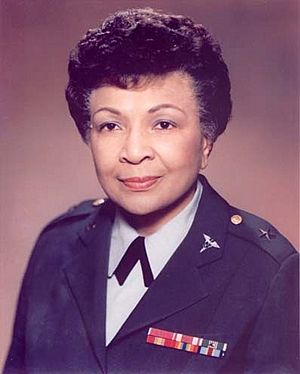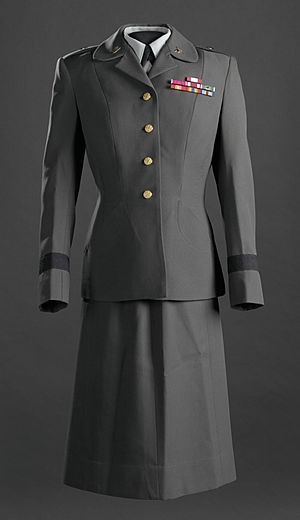Hazel Johnson-Brown facts for kids
Quick facts for kids
Hazel Johnson-Brown
|
|
|---|---|

Johnson-Brown as a brigadier general, circa 1979
|
|
| Born | October 10, 1927 West Chester, Pennsylvania |
| Died | August 5, 2011 (aged 83) Wilmington, Delaware |
| Buried | |
| Allegiance | United States |
| Service/ |
United States Army |
| Years of service | 1955–1983 |
| Rank | Brigadier General |
| Commands held | United States Army Nurse Corps |
| Awards | Army Distinguished Service Medal Legion of Merit Meritorious Service Medal Army Commendation Medal (2) |
Hazel Winifred Johnson-Brown (born October 10, 1927 – died August 5, 2011) was an amazing nurse and teacher. She served in the United States Army for many years, from 1955 to 1983.
In 1979, she made history. Hazel Johnson-Brown became the first Black woman to reach the rank of general in the U.S. Army. She was also the first Black chief of the United States Army Nurse Corps. This important role meant she led all the Army nurses. She also directed the Walter Reed Army Institute of Nursing.
Contents
Early Life and Nursing Dreams
Hazel Winifred Johnson was born on October 10, 1927. Her family lived in West Chester, Pennsylvania. Her parents, Clarence and Garnett Johnson, were farmers. They raised animals and sold fruits and vegetables. Hazel was one of seven children in her family.
She went to East Whiteland Elementary School. Later, she attended Tredyffrin-Easttown Junior Senior High School. Everyone thought she was a very bright student.
When she was 12, Hazel knew she wanted to be a nurse. She tried to get into a local nursing school. But she was turned away because she was Black. This did not stop her. In 1947, she moved to New York City. There, she attended the Harlem School of Nursing. After graduating, she began her nursing career. She worked as a staff nurse in the emergency ward at Harlem Hospital.
A Trailblazing Military Career
Hazel Johnson-Brown joined the United States Army in 1955. This was seven years after President Harry Truman ended segregation in the military. This meant Black and white soldiers could serve together.
She quickly moved up in the Army. Her skills in the operating room impressed everyone. She was a very talented surgeon. She took assignments all over the world, even in Asia. She served in Japan and helped train nurses. These nurses were preparing to go to Vietnam.
In 1977, Ebony magazine wrote about her. They called her "one of the real 'heavies' in her field." The magazine even predicted she would become "the first black woman general."
Just two years later, she made that prediction come true. She was promoted to brigadier general. This was a huge moment in history. With this promotion, she became the leader of 7,000 nurses. She was the first Black woman to hold this top position in the Army Nurse Corps.
When she was promoted, she said something very important. She stated, "Race is an incidence of birth." She added, "I hope the criterion for selection did not include race but competence." This meant she hoped she was chosen for her skills, not her race.
She earned several college degrees. She had a nursing degree from Villanova. She also had a master's degree in teaching from Columbia. Her military career was full of achievements. She won many awards, like the Army Distinguished Service Medal. She was also named Army Nurse of the Year twice. Other awards included the Meritorious Service Medal and the Army Commendation Medal.
Life After the Army
After retiring from the Army in 1983, Hazel Johnson-Brown continued to work hard. She led the government relations unit for the American Nurses Association. She also became a professor at George Mason University. There, she directed the Center for Health Policy.
Her success came from her amazing personality and sharp mind. She treated everyone with respect. She also expected to be treated fairly in return. She once recalled a time she and her mother were ignored at a restaurant. White customers were served first. When their order finally came, she refused it. She told the waitress, "Now you eat it." Then she told her mother, "Let's go." She was never afraid to speak up when she faced unfair treatment. Her sister, Gloria Smith, said Hazel "always was a people person."
In 1990, during Operation Desert Storm, she volunteered to help. She worked in the surgical suite at Fort Belvoir, Virginia's Army Hospital. She spent her final years living with her sister in Wilmington, Delaware.
Personal Life and Lasting Impact
In 1981, Hazel married David Brown. She added his last name to hers, becoming Hazel Johnson-Brown.
She was a Catholic and a member of St. Clare in Clifton, Virginia. Her funeral Mass was held there.
Hazel Johnson-Brown passed away on August 5, 2011, in Wilmington, Delaware. She was 83 years old. She was on her way to the hospital when she died. The cause of her death was Alzheimer's disease. She was buried at Arlington National Cemetery.
Lieutenant Colonel Nancy Cantrell, an Army Nurse Corps historian, remembered her well. She said, "Brigadier General Hazel Johnson-Brown was remarkable." She led the Army Nurse Corps during a time of change. She did so with great dignity and style. She was seen as a wonderful leader and was highly respected and loved.
Honors and Awards
- Candace Award, Health, National Coalition of 100 Black Women, 1984.
- Honorary degree, Long Island University, 1997.
 | Jewel Prestage |
 | Ella Baker |
 | Fannie Lou Hamer |


